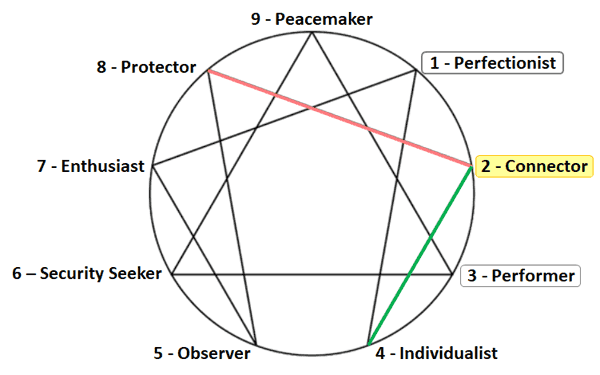The Enneagram Type TWO personality focuses on relationships, helping others, and gaining approval. These individuals strive to improve the human condition through connection. They want to help others find the paths to their highest selves, get what they need along the way, and bring people into their lives for mutual benefit. And, of course, TWOS want to play a role in the unfolding of all that goodness. They are often employed as brokers in loving kindness (e.g., ministry), human potential (e.g., counselling, coaching), or business (e.g., human resources, real estate).
TWOS present themselves as upbeat, energetic, and friendly with an infectious positivity. They carry an underlying belief that they must be helpful and loving to be liked. That orientation makes them stellar colleagues, friends, and family members who go to great lengths to express their affection and provide support. They are great listeners who revel in others’ joys and tap deep wells of empathy in times of sorrow or strife. Woundedness provides fertile ground for nurturing and attentive care. While brimming with compassion, they have limited tolerance for negativity unless they have a role in making it positive.
TWOS process lots of data when meeting new people to determine who they are, how they move, and what they need. They consider themselves unusually skilled at reading people and may use flattery to gain trust and approval. Armed with keen insights, TWOS adapt their behaviors to suit the moods, preferences, and needs of others. (“I’ll be who you need me to be.”) While they clearly find fulfillment in attending to others’ needs, their generosity generally carries an expectation of reciprocal care. TWOS want their acts of service to build ties that bind and may get resentful when they aren’t forthcoming.
At root, TWOS have difficulty believing that they can be loved and accepted for simply being themselves. They form an identity around having a role, being of service, and helping others. They fear disapproval or being disconnected. TWOS relax when others create an opening for relationship and share feelings and concerns that they can internalize. This outward orientation may reflect a fear that others will assess their inner landscape and find it unworthy of attention or love. (“You are nobody until somebody loves you.”)
The ONE wing empowers TWOS to set standards for their work in realizing human potential and reforming the environment. Their drive to relieve suffering finds companionship with a seriousness of purpose toward effective action. The THREE wing provides concern for social standing (i.e., who or what is worthy of attention) and recognition for their work. It also motivates them to be exemplars of interpersonal connection and helpfulness.
TWOS are also influenced by their dominant instinct:
- Self-Preservation TWOS hold a strong expectation that others will attend to their needs. They may work tirelessly to gain that reciprocity, or they may present themselves as child-like and needy to induce others to take care of them. They may also traffic in guilt trips to get what they want. (“After all I’ve done for you…”)
- One-to-One TWOS find comfort in being a best friend, an intimate partner, or the power behind the throne. They crave private time with their significant others and seek exclusivity in the sharing of confidences. To attract this individual, a One-to-One TWO invests time and energy in becoming irresistible. (“I’ll puff you up and then be right beside you.”)
- Social TWOS want to be at the center of the social arena and enroll others in their agenda. A desire to be noticed and remembered prompts them to show up as competent, knowledgeable individuals worthy of admiration. They gravitate toward those who are popular or powerful. They also scan the room to make sure that everyone is OK. (“Has everyone spoken? Do they have what they need?”)
All that helpfulness has a dark side. TWOS can get so caught up in serving others that they forget to take care of themselves. They may become so addicted to a relationship that they foster dependency. They may also become so adept at mirroring their compatriots’ emotional energy that they lose sight of their own emotional core.
Under stress, TWOS may adopt characteristics of an Unhealthy EIGHT. They can be aggressive when fearing loss of an important relationship or when they don’t get what they need out of existing ones. They may become possessive and controlling, a response that likely adds fuel to the fire.
The antidote to stress lies in catching oneself in the act of flattering or serving others solely as a means of currying favor. It means recognizing the underlying fear of worthlessness that often drives this behavior. It calls for cultivating self-love and shedding the overwhelming concern for what others think.
TWOS find strength in movement toward a Healthy FOUR. From this position, they learn to acknowledge their own feelings, needs, and expectations and find more direct means of satisfying them. They give themselves permission to prioritize self-care and cultivate relationships that are genuinely nurturing.
